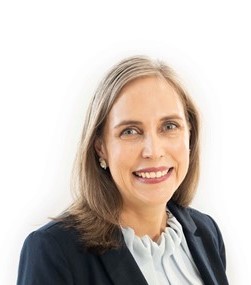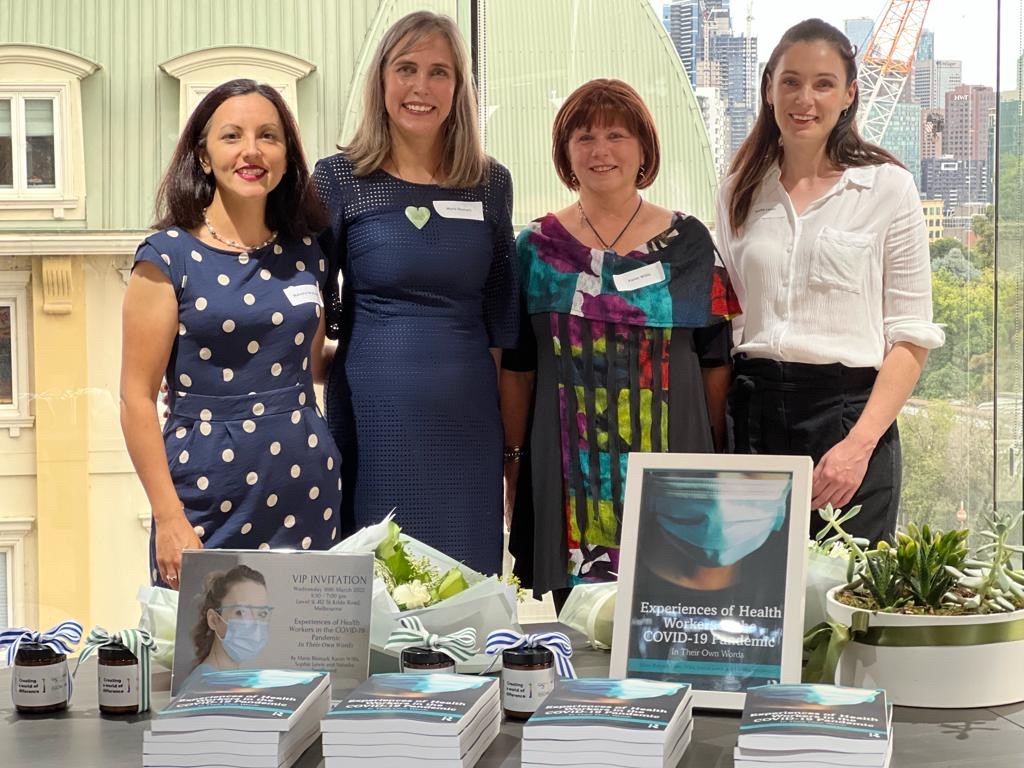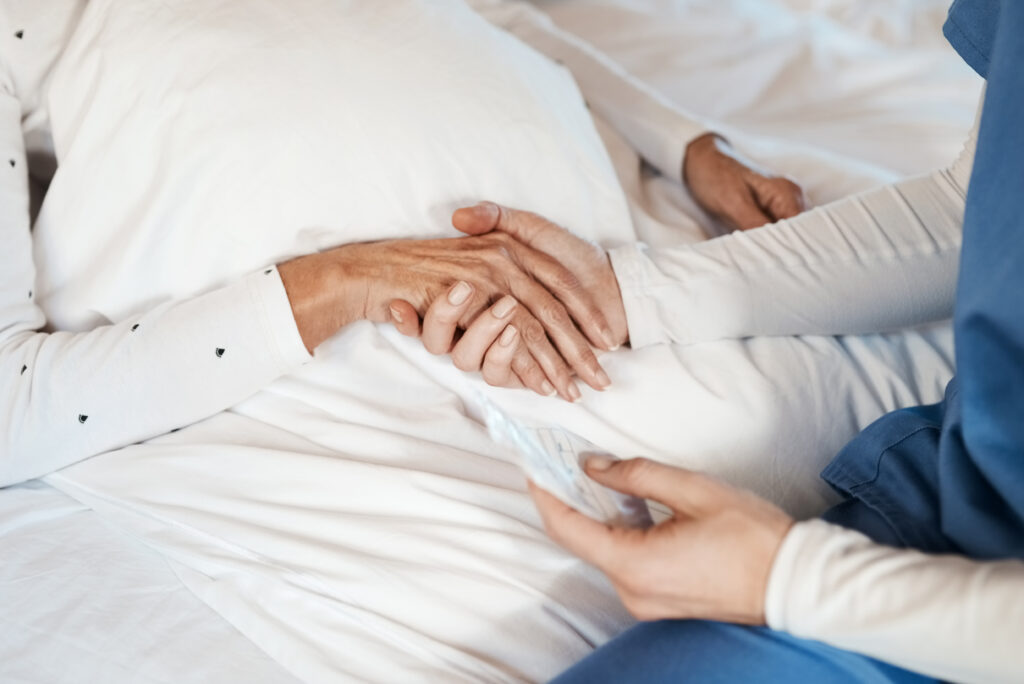University of Melbourne professor of public health Marie Bismark wrote most of Experiences of Health Workers in the COVID-19 Pandemic – in their own words, while in managed isolation herself before Christmas 2020. Drawn from a survey of nearly 10,000 frontline health workers in Australia – including New Zealand nurses – she said the response was overwhelming.
“We never anticipated that people would tell us so many stories – and they were really raw and heartbreaking and deeply personal,” Bismark said. For many, the survey was the first chance they’d had to talk about their experiences – and for nurses, the loss of humanity they felt was striking, she said.
In their own words
I have been burdened by the feeling that this pandemic has caused a decline in the quality of care we are providing to our patients, for our own safety. Procedures being delayed, families not allowed to visit. – Intensive care nurse.
The wearing of masks has made caring for patients so much harder. You can’t see their faces and read their expressions which is so important. – Emergency nurse
All this online, virtual, Zoom, technology stuff just doesn’t have the beneficial result of talking to and being with people. – Emergency nurse
Situations with elderly patients who have lived alone and are neglecting their own health due to not wanting to leave the house, and therefore turning up to hospital in critical situations. – Emergency nurse
For a while my role was ensuring ‘all the boxes were ticked’ before transferring bodies to the morgue. – Aged care nurse
The hardest part of being a nurse has been caring for lonely people who are unable to have visitors. This has been awful and has led me to cry on the way home on multiple occasions. – Intensive care nurse
It is a nightmare. It’s taken everything away from nursing that I love. Holding an iPad to a dying patient to say goodbye and not being able to hug them or care for them like we used to. It’s horrible. – Surgical nurse
Families and some patients tend to take it out on nursing staff … abuse staff on the phone. You try your best initially but it’s just more exhausting. – Hospital aged care nurse
“A lot of nurses, actually, talking about the things they loved most about nursing were taken away by the pandemic, because they were in full personal protective equipment [PPE] and it was really discouraged to have any unnecessary physical contact with patients and patients couldn’t have their loved ones with them.
“There was a really strong sense that some of the humanity of their nursing had been taken away from them.”
One nurse said it was “lots of procedures and no heart,” said Bismark, a doctor and psychiatric registrar who has also provided mental health care to Royal Melbourne Hospital patients during the pandemic.
Many nurses spoke of the guilt they felt, knowing they were providing inadequate care to patients, under the pressure. “As a health practitioner, there is an expectation, and not fulfilling that expectation makes me feel I let people down,” one palliative care nurse said. “Any love I did have for the job is gone and I spend most of my commute to work every day crying,” an emergency nurse said.
Health workers, from intensive care specialists, nurses and midwives to hospital cleaners around Australia, shared a “complete range” of feelings, Bismark said, from “shock and disbelief that this was happening, through to fear – not so much for themselves but for family members, particularly the elderly, or immuno-compromised … and a real fear about bringing the infection home, to their children”, she said.
“I worry that I will get sick and die. I have told my older children what I would like to happen to my body should I die. I usually stress more after I have had prolonged exposure to a COVID-positive patient who has been extremely unwell.” (emergency nurse)
There were also feelings of anger towards anti-vaccination/mandate protestors – “about how hard about how hard it was to go to work to just give everything to care for people, to be in this really selfless role and see the protests and how little regard for others people had”, Bismark said.
“Any love I did have for the job is gone and I spend most of my commute to work every day crying.”
However, there was also pride in being able to help people, and gratitude for the chance to reconnect with family during the lockdown: “Mostly I feel very proud of being a nurse during this pandemic and know how useful and valuable I am to the community and know that I play a pivotal role in the fight against this pandemic,” said one intensive care nurse.
Bismark co-wrote the book with other health academics and physicians, including University of Melbourne associate professor and physician Natasha Smallwood and Victoria University (Australia) public health professor Karen Willlis. Smallwood and Willis co-led the Australian frontline health worker study.
It was on her way home to re-unite with her husband and children in Wellington, via two weeks in an isolation hotel, that Bismark decided to write the book, after her research colleagues asked her to figure out what to do with the thousands of responses to the survey’s final open-ended question about their experiences.

“I couldn’t sleep and just had this incredibly powerful sense that I had to do this, that this was my purpose. . .”
For two “surreal” weeks, Bismark barely slept, “immersed” in thousands of stories from people as she “wrote and wrote”.
“Some were so incredibly personal, like the nurse who had been breastfeeding her baby. With all the PPE she had to wear, they weren’t given any longer breaks, so by the time she got all her PPE off and on again and had a drink of water, there was no time to express her breast milk. So her milk dried up and she had to wean her baby much earlier than she wanted to, which was really distressing and moving.”

Bismark recalled feeling so “hypomanic” about the project, that she almost asked for a mental health check. “The night I decided to write the book, I couldn’t sleep and just had this incredibly powerful sense that I had to do this, that this was my purpose … I’ve never had such a compelling sense that I’ve had to do something.”
Writing the book, she said, was “carthartic”. “It really made me feel much less alone with my experiences, that these things had been hard for other people, too.”
However Bismark’s personal experience of MIQ nursing was “lovely”. One nurse, Seema, went out and bought Bismark a birthday cake from her own money. The two have since kept in touch, with Seema offering to review the book. “Nurses are just the very best human beings.”
A roller-coaster of mood
| Shock: | I often feel a bit numb. Like this is not really happening. Almost like it’s a bit of a daze. – Medical specialty nurse |
| Fear: | I worry that I will get sick and die. I have told my older children what I would like to happen to my body should I die. I usually stress more after I have had prolonged exposure to a COVID-positive patient who has been extremely unwell. – Emergency nurse |
| Exhaustion: | I feel absolutely drained, I want to go to sleep and wake up when it’s over, I’m so, so over it. – Emergency nurse |
| Guilt: | Guilt has been a factor that I didn’t expect in dealing with the pandemic. As a health practitioner there is an expectation, and not fulfilling that expectation makes me feel I let people down. – Palliative care nurse |
| Sadness: | Any love I did have for the job is gone, and I spend most of my commute to work every day crying. – Emergency nurse |
| Anger: | All these people who flaunt the rules, refuse to take precautions. If it was their child intubated in a bed struggling to breathe, they’d want the highest level of medical care, wouldn’t they? They can stay home and stay safe. But we can’t stay home. – Intensive care nurse |
| Pride: | Mostly I feel very proud of being a nurse during this pandemic and know how useful and valuable I am to the community and know that I play a pivotal role in the fight against this pandemic. – Intensive care nurse |
| Gratitude: | We are lucky to come to work. To be able to do something with a group of people you like and respect that helps our patients and their families is a privilege. – Medical specialty nurse |
| Serenity: | I have become closer to my children and more involved with what happens with schooling. Improved routine at home, back to the basics of life without pressures and expectations from communities and sporting activities. – Emergency nurse |
| Admiration: | My colleagues have been truly amazing and resilient throughout this whole situation. I have nothing but respect and love for how hard everyone has been working and how strong they all are. – Hospital aged care nurse |



